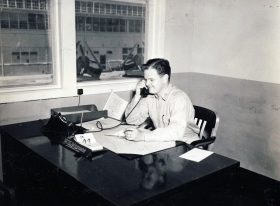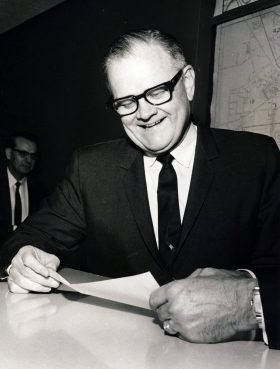Meet William H. Maness ’38—fighter pilot, judge, state legislator, lawyer and long-time civil rights movement supporter—who defied the norms of his time.
 By Shakori Fletcher ’16
By Shakori Fletcher ’16
History gives us the opportunity to look at people with a richer perspective only provided by the passage of time. Take William H. Maness ’38, for example. By early 20th century standards, the Erwin, N.C., native was most likely categorized solely based upon race, gender, geography—white, male, raised in the South. But a look at his lifelong journey gives us the true essence of the man: His legacy in Jacksonville, Fla., as a fighter pilot, circuit judge, state legislator, lawyer and long-time vocal civil rights movement supporter.
Maness graduated from Elon in 1938. He worked in insurance and briefly returned to Elon as a special assistant to President L.E. Smith before being drafted by the military during World War II. Following a distinguished career as a naval aviator, he enrolled in Stetson University School of Law, graduating in 1948, and practiced law until 1957, when he was appointed as a judge in the Fourth Judicial Circuit. In 1963, he stepped away from the bench and returned to private practice, continuing to work until 2010. He died the following year at age 94.
Among a personal collection he donated to Elon University’s Belk Library Archives & Special Collections are a variety of materials relating to his tenure as a judge, as well as issues of racism, social inequality, the civil rights movement and the strides people took to promote the well being and equality of all. The collection includes direct correspondence with Langston Hughes, a copy of Martin Luther King Jr.’s “I Have A Dream” speech and years of subscriptions to The Crisis Magazine, a NAACP publication founded by W.E.B. Du Bois. Maness’ early documented involvement with the civil rights movement found in the collection dates to a 1964 letter to Howard Rogerson, then staff director for the U.S. Commission on Civil Rights. At that time, Maness served as the elected chairman of the Community Relations Committee, an entity that, although ultimately unsuccessful, called for an early end to racism in Jacksonville. In his letter to Rogerson, Maness wrote that his first order of business as chairman was to “immediately and cooperatively” desegregate and accept the patronage of all people, “without restrictions based solely on race, color, or national origin.”
On Oct. 19 of that same year, Maness turned to poetry to express his frustration over race relations in America. He wrote four poems that day—“Danger,” “Scared to Talk,” “Folly” and “Race”—captioning the poems with this note: “These I wrote on train while agonizing over the NCC and race returning from Washington,” likely referring to the National Council of Churches, which had been lobbying for the passage of the Civil Rights Act. Seemingly grappling with a call to speak out in the midst of silence, the fourth poem, “Race,” ends with the stanza:
Men did hide, find excuses,
None good, just all bad.
So when time came for action,
It was sad, sad, sad!
 Maness continued efforts in 1965 with elections to councils and commissions committed to civil rights. First came an October nomination to the board of directors of the Human Relations Council of Greater Jacksonville. All of Maness’ council involvements were not seen favorably, however. When elected to the Southern Regional Council, which advocated for equal opportunity for all peoples in the South, SRC Director Paul Anthony accompanied the news with a letter essentially giving Maness the option of “disassociation,” as he knew it would be unpopular for Maness to be associated with the Council as he prepared for an upcoming Senate race. In his response, Maness wrote, “For me to take what appears to be the more tempting and perhaps easier course would be too much like taking the course I urge others not to follow. … I’ll accept membership, for better or for worse, still confident and optimistic that truth and justice will ultimately prevail.” Maness’ Senatorial bid was ultimately unsuccessful.
Maness continued efforts in 1965 with elections to councils and commissions committed to civil rights. First came an October nomination to the board of directors of the Human Relations Council of Greater Jacksonville. All of Maness’ council involvements were not seen favorably, however. When elected to the Southern Regional Council, which advocated for equal opportunity for all peoples in the South, SRC Director Paul Anthony accompanied the news with a letter essentially giving Maness the option of “disassociation,” as he knew it would be unpopular for Maness to be associated with the Council as he prepared for an upcoming Senate race. In his response, Maness wrote, “For me to take what appears to be the more tempting and perhaps easier course would be too much like taking the course I urge others not to follow. … I’ll accept membership, for better or for worse, still confident and optimistic that truth and justice will ultimately prevail.” Maness’ Senatorial bid was ultimately unsuccessful.
Still, Maness remained steadfast in his convictions. He even took a strong stand in 1966 that would ultimately be recorded in Jacksonville history. In a February meeting of the Jacksonville Bar Association, Maness, then serving as president, nominated Leander Shaw to be the association’s first black member. Shaw would later go on to serve as a Florida Supreme Court Justice. In a 2011 article published by The Florida Times-Union, in a front-page tribute following Maness’ passing, Shaw said of Maness: “Bill was way ahead of his time. He knew things were wrong and he had to do something about it. And back then, you lost friends. Neighbors would cross the street rather than talk to you. Bill knew this was going to happen.”
In another printed work titled “Let’s Write a Better Story of Jacksonville in 1965,” Maness challenged the community to take firm measures to address racial tensions and bring about lasting changes to end any vestiges of segregation. “Such changes at this point will not be drastic, because much progress has been made, but changes in attitudes and practice are nonetheless essential if we are to move further away from the dark ages of injustices and fear,” he wrote. “And just who is the ‘leadership’ that must spark these changes? The short answer is: ‘Everybody!!’”
Fifty years later, in communities far and near, Maness’ call to action remains relevant.


